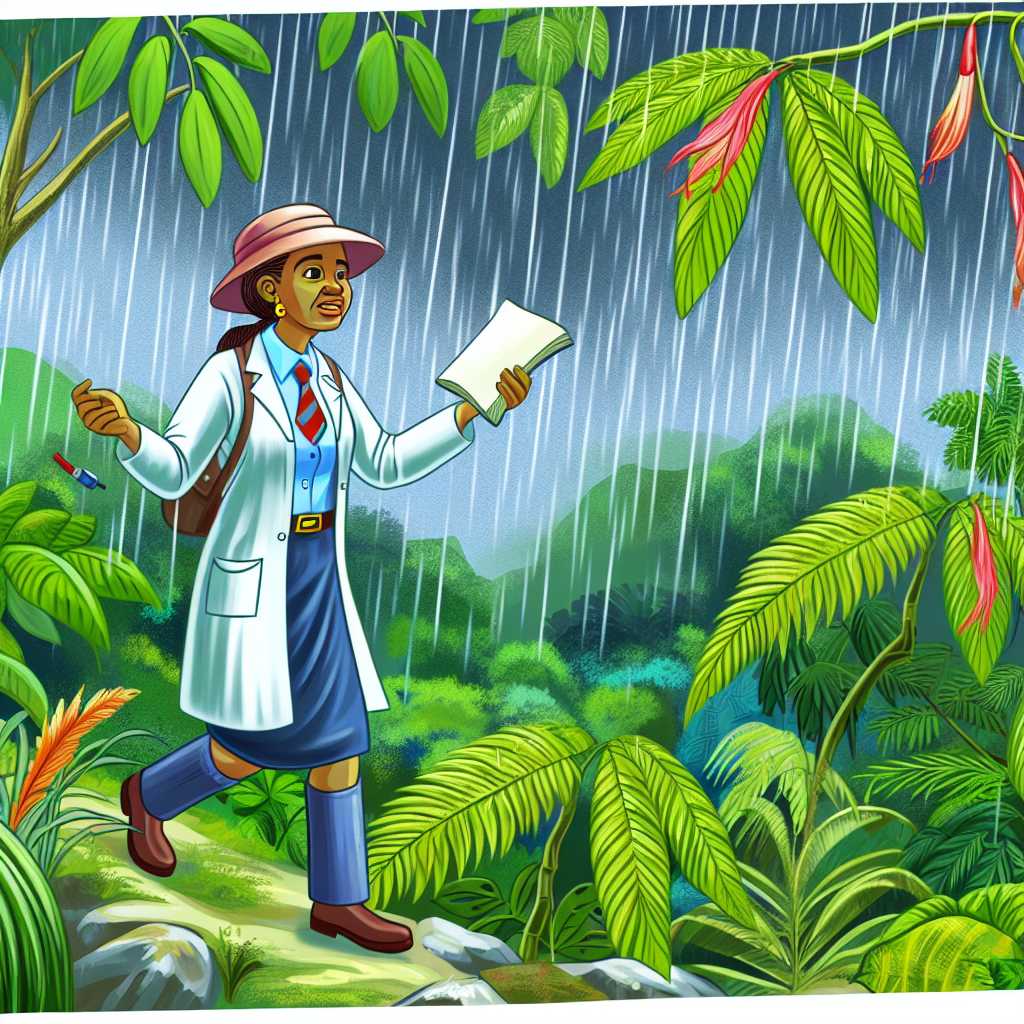Applied botany education plays a vital role in Nigeria’s agricultural sector.
Challenges Facing Applied Botany Education in Nigeria:
Lack of Adequate Funding:
One major challenge is the insufficient financial support for botany programs.
Outdated Curriculum:
The curriculum often lacks relevance to modern agricultural practices, hindering student learning.
Shortage of Qualified Instructors:
There is a scarcity of skilled botany educators, leading to a compromised quality of education.
Insufficient Practical Training:
Students do not have enough hands-on experience in botanical research and fieldwork.
Inadequate Infrastructure:
Lack of laboratories, research facilities, and botanical gardens limit practical learning opportunities.
Low Public Perception:
Applied botany is often undervalued, resulting in low enrollment rates and limited career opportunities.
Addressing these challenges is essential to improving applied botany education in Nigeria and fostering a thriving agricultural sector.
Lack of Infrastructure
One of the major challenges facing applied botany education in Nigeria is the lack of adequate infrastructure.
This includes:
- Insufficient laboratory facilities for practical learning
- Inadequate botanical gardens and research centers for hands-on experience
Without proper infrastructure, students studying botany struggle to gain practical skills and experience that are essential for their education and future careers.
Many universities and colleges in Nigeria lack well-equipped laboratories where students can conduct experiments and learn hands-on skills in plant identification, classification, and analysis.
Furthermore, the absence of botanical gardens and research centers limits students’ exposure to a wide variety of plant species and ecosystems that are crucial for their understanding of botany.
Hands-on experience in botanical gardens helps students apply theoretical knowledge to real-world scenarios, fostering a deeper understanding of plant biology and ecology.
Without access to proper infrastructure, students miss out on valuable learning opportunities that could enhance their knowledge and skills in applied botany.
It is imperative for the government and educational institutions in Nigeria to invest in improving infrastructure for botany education to ensure that students receive comprehensive and practical training in this field.
Shortage of qualified teachers:
One of the major challenges facing applied botany education in Nigeria is the shortage of qualified teachers.
This shortage can be attributed to several factors that hinder the recruitment of experienced botanists to teach specialized courses in universities and other educational institutions across the country.
Finding experienced botanists who are willing to take up teaching positions can be quite difficult.
Many botanists prefer to pursue careers in research or industry rather than academia.
As a result, there is a limited pool of qualified individuals available to teach students in applied botany programs.
Additionally, the limited availability of experts in the field poses a challenge when it comes to mentoring students.
As aspiring botanists need guidance and supervision from experienced professionals to develop their skills and knowledge, the lack of mentors can hinder their growth and development in the field.
To address this challenge, educational institutions in Nigeria need to invest in recruitment efforts to attract qualified botanists to teaching positions.
Creating incentives such as competitive salaries, research opportunities, and professional development programs can help attract and retain experienced professionals in the field of applied botany education.
- Difficulty in finding experienced botanists to teach specialized courses
- Limited availability of experts in the field to mentor students
Explore Further: Scholarships for Applied Biology Students in Nigeria
Outdated curriculum:
One of the major challenges facing applied botany education in Nigeria is the issue of an outdated curriculum.
The curriculum being used in most institutions is not aligned with the current trends and developments in the field of botany.
This has resulted in a gap between what students are being taught and what is actually relevant in the industry today.
The lack of alignment with current trends means that students are not being equipped with the necessary skills and knowledge to succeed in the field of botany.
As a result, graduates may find it challenging to secure employment or excel in their careers.
Moreover, the outdated curriculum also fails to incorporate practical, industry-relevant skills that are essential for students to thrive in the field.
Hands-on experience and practical knowledge are crucial for students to understand how theoretical concepts apply in real-world scenarios.
Without this practical training, students may struggle to bridge the gap between theory and practice.
To address this challenge, it is imperative for educational institutions to update their curriculum regularly, taking into account the latest trends and developments in botany.
This will ensure that students are equipped with the relevant skills and knowledge needed to succeed in the field.
Additionally, incorporating more practical, industry-relevant skills into the curriculum will better prepare students for the demands of the job market and contribute to their overall success in the field of botany.
- Curriculum not aligned with current trends and developments in botany
- Lack of practical, industry-relevant skills being taught to students
Delve into the Subject: Applied Zoology vs. General Zoology: Key Differences
Challenges Facing Applied Botany Education in Nigeria
One of the major challenges facing applied botany education in Nigeria is the issue of limited funding.
The budget allocated to support research and educational initiatives in this field is often insufficient.
Transform Your Career with Expert Guidance
Get personalized mentorship consulting that’s tailored to your unique path. Our expert advice is actionable and exclusive.
Get StartedThis lack of financial resources can hinder the advancement of botanical studies and impact the quality of education provided to students.
In many academic institutions offering botany programs, there is a struggle to secure adequate funding for research projects, fieldwork, and the purchase of essential equipment.
Without sufficient financial resources, faculty members and students may face limitations in conducting comprehensive studies and experiments.
This not only affects the overall quality of education but also hampers the ability to make meaningful contributions to the field of botany.
Furthermore, the lack of funding also translates into challenges in maintaining and updating facilities and equipment essential for practical training in applied botany.
Laboratories, greenhouses, and botanical gardens require regular maintenance and modernization to ensure they meet the standards necessary for effective education.
However, without the necessary financial resources, these facilities may become outdated and inadequate, limiting students’ hands-on learning experiences.
Additionally, insufficient funding can restrict opportunities for faculty members to engage in cutting-edge research and professional development.
Without access to adequate resources, educators may struggle to stay abreast of the latest advancements in botany and incorporate them into their teaching.
This can result in outdated curriculum and teaching methodologies that do not adequately prepare students for the demands of the field.
Addressing the challenge of limited funding is essential to enhancing the quality of applied botany education in Nigeria.
By prioritizing financial support for research, educational initiatives, and facility updates, academic institutions can ensure that students receive a comprehensive and up-to-date botanical education.
This education equips them for success in their careers.
It is imperative for stakeholders to recognize the importance of investing in botany education to nurture the next generation of botanists and contribute to the advancement of the field in Nigeria.
- Insufficient budget allocated to support research and educational initiatives.
- Inadequate financial resources to update facilities and equipment.
Uncover the Details: Future Prospects of Nigeria’s Ship Building Industry
Challenges in Applied Botany Education in Nigeria
One of the major challenges facing applied botany education in Nigeria is the low enrollment rates.
This issue can be attributed to several factors:
Lack of awareness about the potential career opportunities in applied botany
Many students in Nigeria are not aware of the various career paths that can be pursued with a degree in applied botany.
This lack of awareness leads to a lack of interest in enrolling in programs related to the field.
Perceived lack of job security and financial stability in the field
Another reason for the low enrollment rates in applied botany education is the perception that there are limited job opportunities and financial rewards in the field.
Many students opt for other more “lucrative” fields, leading to a decrease in enrollment numbers.
In order to address these challenges and increase enrollment rates in applied botany education in Nigeria, several strategies can be implemented:
Creating awareness about career opportunities
Collaboration between academic institutions, industry partners, and government agencies can help to create awareness about the diverse career opportunities available in applied botany.
This can be done through career fairs, seminars, and informational sessions targeted at students.
Highlighting job security and financial stability
Educational institutions offering applied botany programs can highlight the job security and financial stability that graduates can expect in the field.
Providing data on average salaries, job placement rates, and success stories of alumni can help to dispel misconceptions about the viability of a career in applied botany.
Moreover, initiatives such as scholarships, internships, and mentorship programs can also attract more students to enroll in applied botany education programs.
By offering financial support and guidance, educational institutions can make the field more accessible and appealing to a wider range of students.
Collaboration with industry partners
Academic institutions can also collaborate with industry partners to offer practical training, research opportunities, and job placements for students studying applied botany.
This hands-on experience can help students see the real-world applications of their studies and increase their interest in pursuing a career in the field.
Addressing the low enrollment rates in applied botany education in Nigeria requires a multi-faceted approach that involves creating awareness about career opportunities, highlighting job security and financial stability, and collaborating with industry partners.
By implementing these strategies, educational institutions can attract more students to enroll in applied botany programs and ultimately contribute to the growth and success of the field in Nigeria.
Find Out More: Frequently Asked Questions about Applied Biology

Ineffective policies and regulations:
- Absence of clear guidelines for accrediting botany programs in universities
- Regulatory barriers hindering the growth and development of applied botany education
One of the significant challenges facing applied botany education in Nigeria is the ineffective policies and regulations that govern the accreditation and development of botany programs in universities.
The absence of clear guidelines for accrediting botany programs creates a lack of standardization and quality control, leading to inconsistencies in the education provided to students.
Furthermore, regulatory barriers imposed by government agencies and educational bodies hinder the growth and development of applied botany education in the country.
These barriers can include stringent requirements, bureaucratic processes, and delays in approvals, which can limit the establishment of new botany programs and restrict innovation in teaching and research.
Impact on students and institutions:
- Diminished quality of education and training for botany students
- Limited opportunities for collaboration and research in applied botany
The ineffective policies and regulations surrounding botany education have direct implications for both students and institutions.
The lack of clear accreditation guidelines results in a diminished quality of education and training for botany students, as there are no benchmarks for assessing the proficiency of programs and instructors.
Additionally, regulatory barriers impede opportunities for collaboration and research in applied botany, limiting the ability of institutions to engage in partnerships with industry, government agencies, and other academic institutions.
This lack of collaboration stifles innovation and restricts the development of new technologies and solutions in the field of botany.
Recommendations for improvement:
- Establish clear accreditation guidelines for botany programs
- Simplify regulatory processes to encourage the growth of applied botany education
To address these challenges, it is essential for regulatory bodies and educational institutions to work together to establish clear accreditation guidelines for botany programs.
These guidelines should outline the criteria and standards that programs must meet to ensure the quality of education provided to students.
Additionally, regulatory processes should be simplified to remove unnecessary barriers and bureaucratic hurdles that hinder the growth of applied botany education.
By streamlining approval processes and reducing red tape, institutions will be better equipped to innovate, collaborate, and enhance the quality of botany education in Nigeria.
Lack of Industry Partnerships:
Limited collaborations with botanical industries for internships and job placements hinder practical experience for students.
Absence of real-world exposure deprives students of opportunities to apply their theoretical knowledge in practical settings.
Challenges in Applied Botany Education in Nigeria
The challenges facing applied botany education in Nigeria are multifaceted.
These challenges require urgent attention and action.
The lack of practical training facilities significantly hinders student development.
Additionally, an outdated curriculum fails to meet current educational needs.
Inadequate funding further poses obstacles to the development of skilled botanists.
Increased government support is urgently needed for modernization efforts.
Investment in educational infrastructure is critical for practical learning.
Collaboration with industry partners can bridge the gap between academia and the workforce.
Curriculum reform must take place to keep pace with industry demands.
By addressing these challenges, Nigeria can enhance applied botany education.
This will produce a new generation of competent botanists.
These professionals can contribute to sustainable development and conservation efforts.
Additional Resources
Delta State University, Abraka, Nigeria. Principal Officers
Plant and Soil Sciences | College of Agriculture and Natural …




